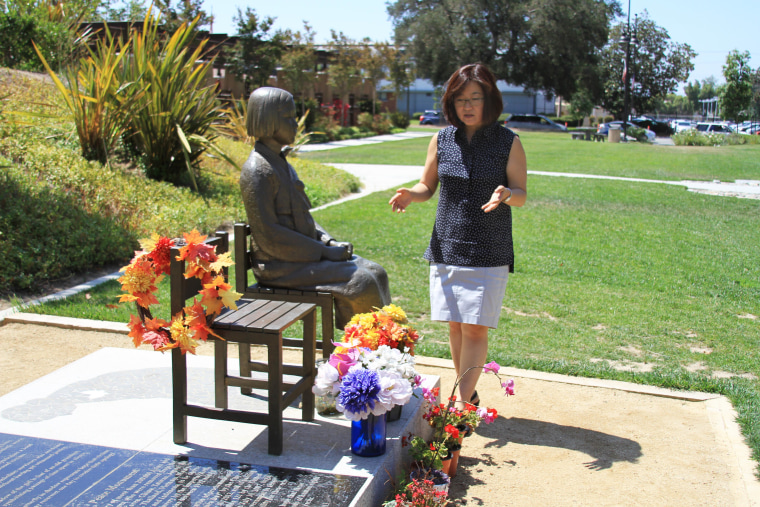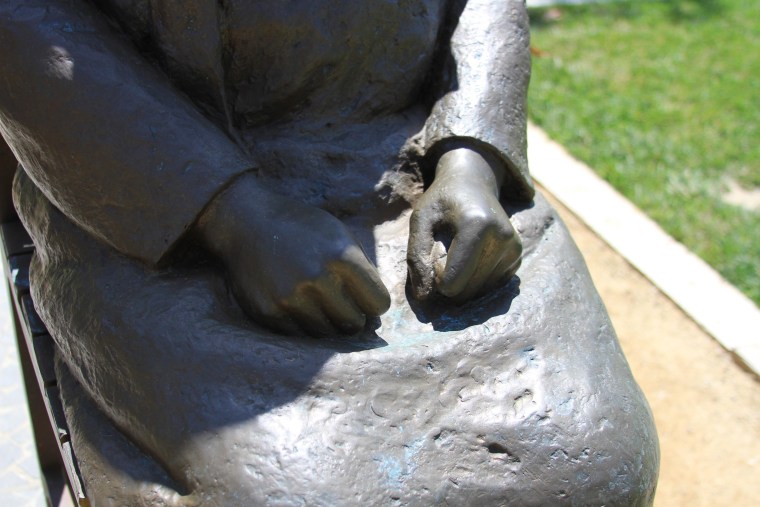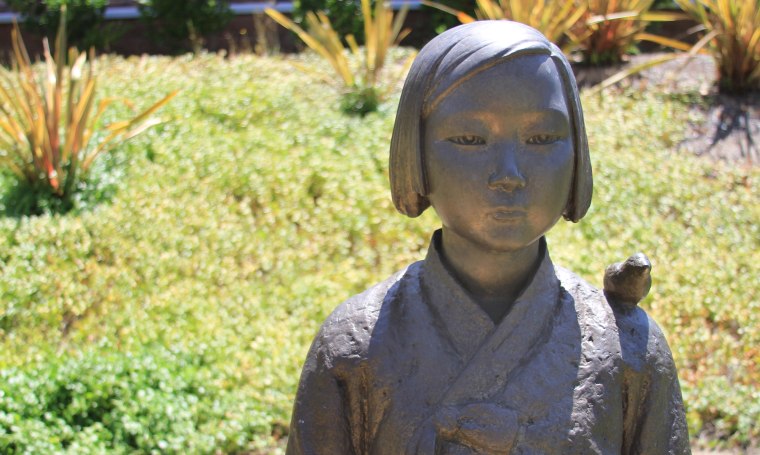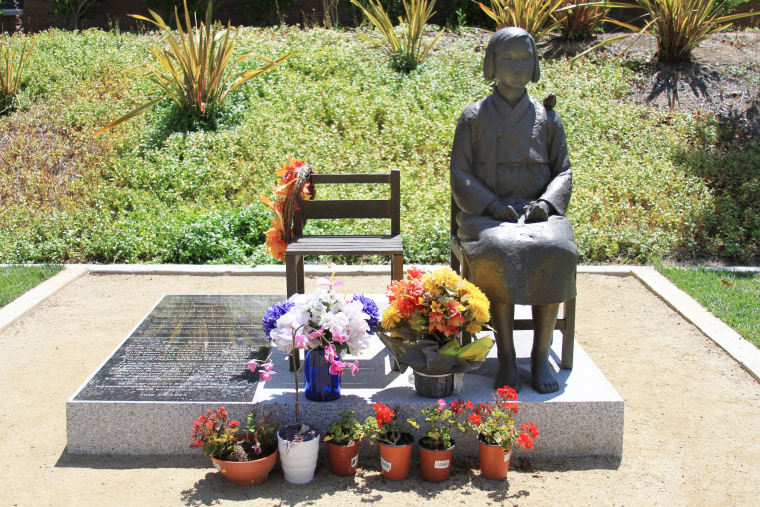GLENDALE, California -
Every week, 44-year-old Phyllis Kim makes spends ten minutes visiting the Comfort Women statue here.
She holds the small, bronze fists in a moment of silence. She tends to the flowers surrounding the memorial. She stands next to the statue in a show of solidarity.
Kim repeats this ritual as part of the Korean American Forum of California, the organization that helped to fund the statue and campaign for its installment in July 2013.

The so-called comfort women were the nearly 200,000 young Korean and Chinese women and girls, some as young as 14, forced into sexual slavery for Japanese troops during World War II. Victims have testified that they were raped up to 40 times daily. Many were abducted, threatened, or deceived into the role with promises of work as nurses or in factories.
The simple statue in this Los Angeles suburb represents justice not yet served, says Kim. But to others, it also symbolizes an open wound of war between the three East Asian countries, and has triggered a local, legal battle some see as a microcosm of lingering, international tensions.
“It’s between Japan and Korea war time...America has nothing to do with it.”
The story of the statue began with the passage of U.S. House Resolution 121 in 2007, which urged the Japanese government to "formally acknowledge, apologize, and accept historical responsibility in a clear and unequivocal manner for its Imperial Armed Forces' coercion of young women into sexual slavery, known to the world as 'comfort women.'"
In 1993, the Japanese government issued a brief statement acknowledging the existence of comfort women and expressing remorse for what they endured. In 2007, Japanese Prime Minister Shinzo Abe was pressured into issuing an apology after first denying there was any evidence of women being coerced into sexual service during WWII. But he stopped short of meeting victims' and advocates' demands that Japan acknowledge its military was responsible.

That’s when Kim and the Korean American Forum began petitioning local governments to raise public awareness and “to pressure Japan to do the right thing.” The result was the statue, the first comfort women memorial on the West Coast, located in Glendale largely because the city had the space and willingness to host it.
But the statue's installation, decades after and thousands of miles from the war and its atrocities, was not without controversy.
The City Council of Glendale received hundreds of protest emails from Japan. A group of Japanese Americans have now filed a lawsuit to remove the statue, arguing the city government has infringed on the federal government's right to conduct foreign policy.
90-year-old Michiko Gringery, the lawsuit's lead plaintiff, says the statue ruins relations with Japan, especially for Glendale’s sister city program with Higashiosaka, Japan. She says she does not understand why the statue has to be in America.
“It’s between Japan and Korea war time," said Gringery. "America has nothing to do with it.”
Gringery says she was a little girl during the war, and did not even know about comfort women until the issue of the Glendale statue was raised.
"The world has to know, and be educated"
Aaron Caplan, Constitutional Law Professor at Loyola Law School in L.A., says the lawsuit will not likely hold up.
“The U.S. constitution puts the national government in charge of foreign policy, but a local government's choice of artwork for a city park does not fall within the constitution's vision of foreign policy,” Caplan said.
“The City of Glendale has the power to choose which artwork it will display on its property. If individual citizens of Glendale don't like the artwork the City has chosen, they can use the local political process to try to change it. They don't have a legal basis to force a federal judge to change it."
Even today, the historical narrative of WWII remains a sensitive, often-debated topic for the national governments of Japan, South Korea, and China.
Recently, China drew attention to Japan’s military and colonial past by bringing the issue of the 1937 Nanjing Massacre before the United Nations. A Japanese panel this month confirmed the validity of a study that led to Japan's landmark 1993 apology for forcing Asian women into wartime prostitution.
Officials in South Korea and China have repeatedly criticized Japanese leaders for backpedaling from past apologies and acknowledgements of wartime atrocities.
Kim says she believes any official Japanese apology is repeatedly undermined each time an official changes or shifts language on the issue.

“That’s the Japanese’s strategy to say one thing here and one thing another. They always say we have apologized numerous times," said Kim. "If they cannot come up with a unified issue of the view, we cannot accept one side of their action as truthful. It has to be consistent."
The issue, Kim argues, is not a diplomatic one about history, but a human rights concern for the future of all nations.
"We take so many things - the rights to our body, the rights to vote, the rights to be equal, the rights to the freedom of speech, the rights to marry and live a happy life - for granted," said Kim. "The world has to know, and be educated - that is the only solution to this vicious cycle of violence against women and children."
“It is important to remember what happened."
